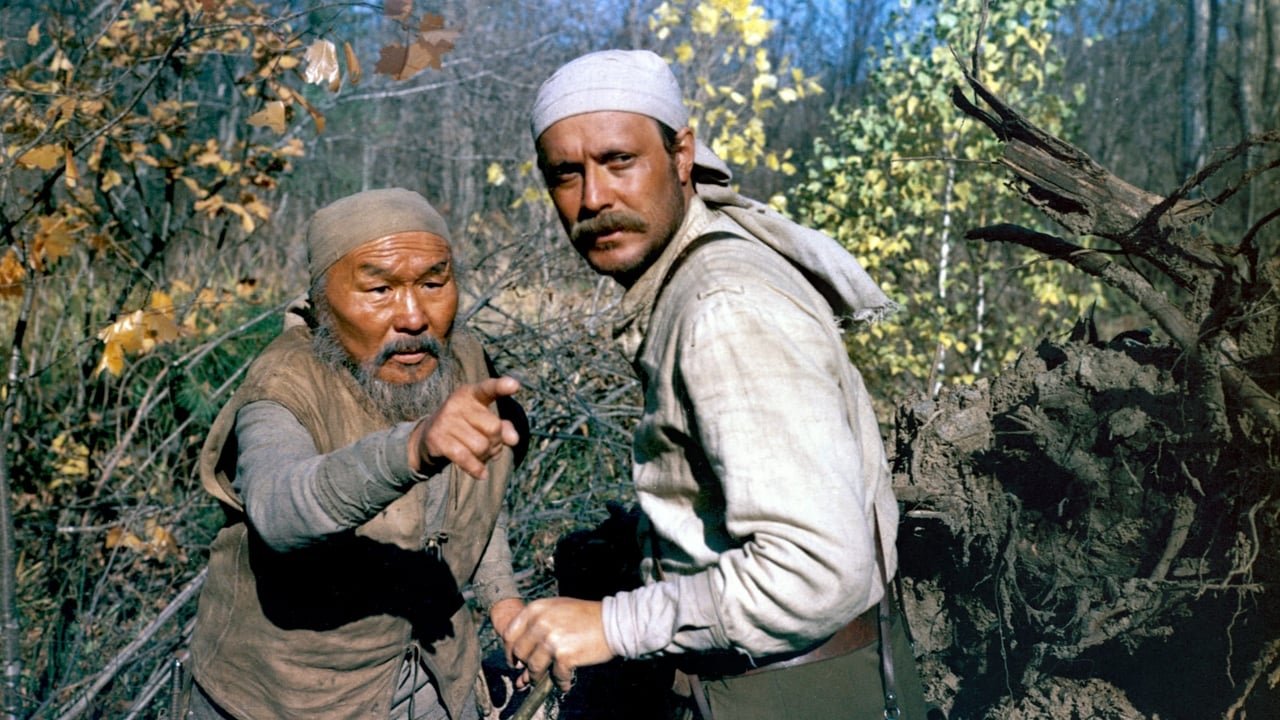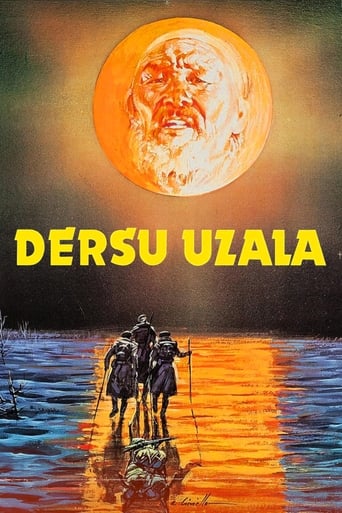

I like the storyline of this show,it attract me so much
... View MoreToo many fans seem to be blown away
... View MoreThe performances transcend the film's tropes, grounding it in characters that feel more complete than this subgenre often produces.
... View MoreExcellent and certainly provocative... If nothing else, the film is a real conversation starter.
... View MoreThis film was made when a member of the Russian embassy contacted Akira Kurosawa, asking him to make a Russian film for Russians. The result? A beautiful film, both inside and out. What I mean is that it stands out as an art piece, the mise-en- scène, the cinematography. But also as a beautiful portrait of the great friendship shared by two men with two distinct ways of living, two seemingly contradicting mindsets, and two disparate socioeconomic strata. So much if the film is dependent on acting performances and emotion rather than dialogue. As always, Kurosawa relied heavily on the symbolic nature of natural phenomena (rain, snow, a rainbow) to aid in his storytelling. (Pun intended.) Kurosawa's first film not in Japanese, as well as his only work in 70mm. Production took three years, being shot entirely outdoors in nature on location in Russia, of course making for some magnificent cinematography. As a side note, the fascinating fact that this achievement by Japanese director Akira Kurosawa won the Academy Award for Best Foreign Language Film for Russia finally motivated me to figure out what, exactly, the Academy considers a "Foreign Language Film". This is something I have wondered about for sometime but was unable to discern, until now. What I had to do was the obvious. Go to the source. (http://www.anica.it/allegati/OSCAR/90_FLFA_RU LE_THIRTEEN.pdf) I also found an article that elucidates the small details for interested readers. (https://www.thoughtco.com/qualifying-best- foreign-language-film-oscar-2421430)
... View MoreAkira Kurosawa's breathtaking "Dersu Uzala" looks at a meeting of cultures in pre-revolutionary Russia, as a captain in the czar's army befriends a hunter in Russia's far east. Even as Dersu helps the platoon negotiate the forest and tundra, it is clear that his way of life is dying out as the Russian Empire expands and swallows the indigenous peoples of northeast Asia.The movie has some of the most amazing cinematography. I wouldn't expect a Kurosawa movie to be anything except great, but this movie has to be seen to be believed. There is no description that I can give that will do "Dersu Uzala" justice. It is one of the movies that you must see before you die.
... View MoreAkira Kurosawa's "Dersu Uzala," winner of the 1975 Oscar for Best Foreign Language Film, is as heartwarming as a cartoon from Disney's golden era, but only the title character can understand the talking trees and animals.Filmed in Russian in the Soviet Union, "Dersu Uzala" has the distinction of being the only film Kurosawa made outside Japan. Released in 1975, it was made at a time when the Japanese film industry was beginning to discover that children's movies were cheaper and easier to produce, thanks to the low-cost of animation and a less discerning audience ensuring a reasonable return on the studios' investment. The studios, concerned only with profit and not the artistic merit of films, could no longer justify the bloated costs of Kurosawa's epics. This signaled the beginning of the end for the Tokyo film industry, which once rivaled Hollywood and Paris in terms of innovation and quality, and eventually changed the Japanese aesthetic to kawaii (cutesy). Kurosawa would later depend upon foreign patrons to finance his films, such as George Lucas, Francis Ford Coppola and Steven Spielberg. And in the case of "Dersu Uzala," the Soviet Union.The film is based on the 1923 travelogue, "Dersu the Trapper" by V.K. Arseniev, which explains why it doesn't follow a conventional story line. The story is basically broken into three parts. The first part is an account of Arseniev's exploration of the Ussuri basin in the Russian Far East. He and his men encounter a Nanai trapper named Dersu Uzala, and commission him to be their guide. At first Dersu is like a magical woodland spirit. Speaking awkward Russian, his world-view is considered quaint to the Soviets, but engenders him with a brand of common sense he needs to survive in the wilderness. Dersu saves Arseniev's life several times.The second part of the story picks up a few years later when Arseniev is making another survey of the Ussuri basin. He runs into Dersu again by chance, and again hires him to be his guide. Dersu is growing older now, and is becoming too senile to survive on his own in the wilderness. Here he relies on Arseniev to save him. Where Dersu came off as the stereotypical "noble savage" in the first part, he now seems more fallible and human.The third and final part is a fish-out-of-water story, as Dersu, believing the wilderness has grown hostile to him, moves to the city to live with Arseniev's family.While something of an oddball in Kurosawa's catalog, the film still has the director's distinctive style. Kurosawa uses his characteristic long takes, in which he leaves the camera stationary and allows the acting to dictate where the viewers' eyes should look."Dersu Uzala" is not just beautiful for its cinematography, but also for its touching human relationships. Arseniev and Dersu come from two different worlds, and they will never be able to fully understand each other. However, they find friendship in each other despite their differences.Unfortunately the U.S.S.R. allowed 20 minutes to be cut out of this 141- minute epic for the Italian release without consulting Kurosawa, which turned off the director from ever making a film outside Japan again.While certainly not Kurosawa's best film, this sweet, but unusual tale is worthy of the director's better-known classics.
... View MoreI have liked the work of kurosawa and satyajit ray. Satyajit rays movies are most moving but now that i have seen dersu uzala. I would say It is the only movie that has ever brought down a smile and a tear in my eye. I am myself a filmmaker of course very small one but i have never been moved so many times in a single movie.To put in short this is the cinematic masterpiece a perfect example of how a simple story can be told in a way you cannot imagine. The cast of this film is perfect the acting better and the direction and screenplay are the best that has ever been. If you are a avid movie goer see this film, its not those boring art movies, or movies you think are experimental. Watch this if you too claim that you been never moved by a story.
... View More